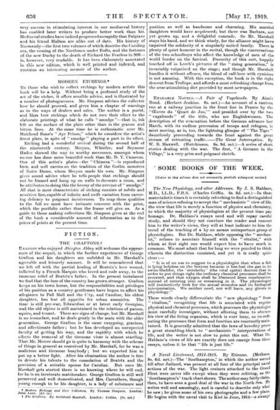FICTION.
THE GRAFTONS.t READERS who enjoyed Abington Abbey will welcome the appear- ance of the sequel, in which the further experiences of George Grafton and his daughters are unfolded in Mr. Marshall's agreeable and leisurely manner. It will be remembered that we left off with the partial healing of Beatrix's love wound, inflicted by a French Marquis who loved and rode away, to the immense relief of Beatrix'a father. In the present instalment we find that the lure of the country has grown stronger. Grafton keeps on his town house, but the responsibilities and privileges of his position as a country gentleman have begun to affect his allegiance to Pall Mall and the CIty, and Caroline, his eldest daughter, has lost all appetite for urban amenities. The time is still pre-war, Edwardian or at latest early Georgian, and the old regime is still maintained in the relations of parson, squire, and tenant. There are signs of change, but Mr. Marshall is no iconoclast, and he deals gently in the main with the older generation. George Grafton is the same easygoing, gracious, and affectionate father ; but he has developed an unexpected faculty of getting his way, and the rapidity with which he effects the removal of the tiresome vicar is almost startling. That Mr. Mercer should go is quite in harmony with the scheme of things in general as conceived by Mr. Marshall, for he was a malicious and tiresome busybody ; but we expected him to put up a better fight. After his elimination the author is free to devote his talents to the consolation of Beatrix and the provision of a suitable spouse for Caroline. But once Mr. Marshall gets started there is no knowing where he will end, for he is an inveterate matchmaker. George Grafton is still well preserved and well domesticated, and Mrs. Carruthers, though young enough to be his daughter, is a lady of substance and • Modern Etchings and their Col:Mom By Thomas Slinpsori, Leaden: John Lane. le..3 t The Oraftons. By Archibald Marshall. London: Collies. Pis. net.] position as well as handsome and charming. His married daughters would have acquiesced; but there was Barbara, not yet grown up, and a delightful comrade. So Mr. Marshall stays his hand, and we think wisely, for the alliance might have impaired the solidarity of a singularly united family. There is plenty of quiet humour in the recital, though the conversations of the two schoolboys who affect the knowledge of men of the world border on the farcical. Precocity of this sort, happily touched off in Leech's pictures of the "rising generation," is invariably vulgarized on the stage; and though Mr. Marshall handles it without offence, the blend of calf-love with cynicism is not amusing. With this exception, the book is in the right descent from Trollope, and affords a most refreshing change from the over-stimulating diet provided by most newspapers.


































 Previous page
Previous page